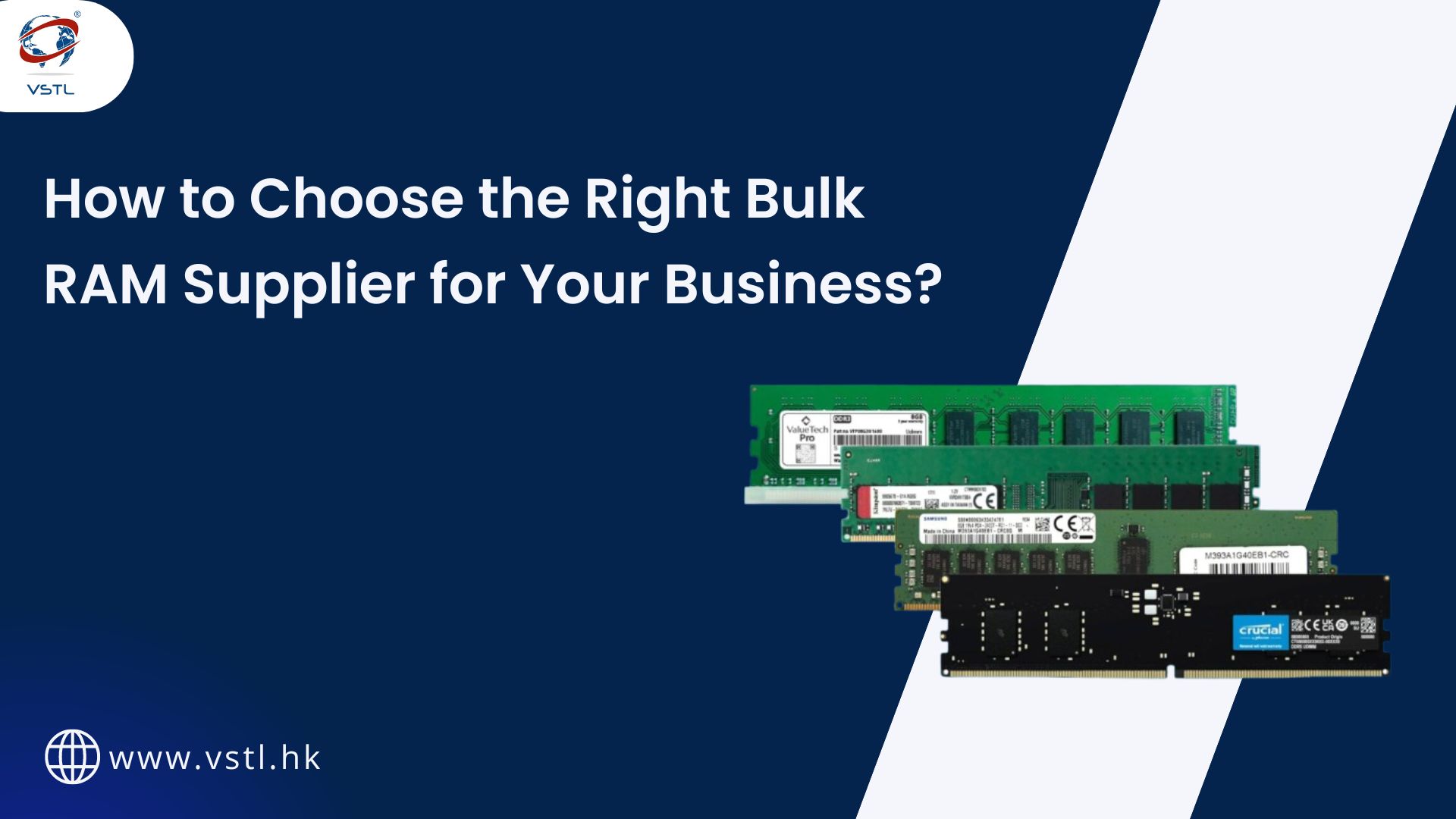
In the fast-paced world of technology, businesses are increasingly reliant on high-quality hardware to ensure smooth operations. RAM (Random Access Memory) plays a critical role in computing, impacting everything from system performance to multitasking efficiency. For businesses involved in system integration, manufacturing, or IT services, finding a reliable bulk RAM supplier can be a game-changer. Whether you are upgrading infrastructure, managing a tech inventory, or reselling to end-users, the right RAM supplier can make a significant difference in cost, quality, and delivery.
In this blog, we will break down the essential factors you need to consider when choosing the right bulk RAM supplier for your business. Whether you’re a tech reseller, a data center operator, or an IT solutions provider, this guide will help you navigate the process of selecting a partner who can meet your needs efficiently and effectively.
1. Understanding Your Business Needs
The first and most important step in choosing the right bulk RAM supplier is understanding your business’s specific requirements. Every business operates differently, and your unique needs will influence the type and quantity of RAM you should source. Here are some aspects to consider:
- Application: Determine the primary use for the RAM. Will it be used for gaming systems, business laptops, servers, or data centers? Each application may require different specifications in terms of speed, capacity, and form factor (DIMM for desktops, SO-DIMM for laptops, etc.).
- Quantity: How much RAM do you need in bulk? Depending on the size of your operation, you may require thousands of units per year or just a few hundred. Knowing your volume requirements helps you negotiate better deals and maintain efficient stock levels.
- Compatibility: Ensure that the RAM you’re sourcing is compatible with the hardware you’re supplying or using. Different devices require different types of RAM, such as DDR3, DDR4, or the more recent DDR5. Compatibility with CPU and motherboard configurations is also crucial.
Understanding your business needs will guide your conversations with potential suppliers and help ensure that they can meet your specific requirements.
2. Supplier Reputation and Track Record
The supplier’s reputation is an essential factor to consider. A reliable bulk RAM supplier should have a strong track record of delivering quality products on time. Here are some ways to evaluate a supplier’s reputation:
- Online Reviews and Testimonials: Research reviews from other businesses that have worked with the supplier. Trusted platforms like Google Reviews, Trustpilot, and industry-specific forums can offer insights into the supplier’s reliability, product quality, and customer service.
- Case Studies and References: A reputable supplier should be able to provide case studies or references from satisfied clients. Don’t hesitate to ask for references from businesses similar to yours in terms of industry, scale, or region.
- Longevity in the Industry: Suppliers with many years of experience are often better equipped to handle the complexities of bulk orders. Established suppliers are likely to have better relationships with manufacturers, allowing them to offer competitive pricing and consistent stock availability.
- Certifications and Accreditations: Look for suppliers with recognized certifications, such as ISO certification for quality management. This can serve as a guarantee that the supplier adheres to high standards in their operations.
Choosing a supplier with a solid reputation and proven track record can save you from future headaches, ensuring that your business receives high-quality RAM in a timely and efficient manner.
3. Product Quality and Testing
When purchasing RAM in bulk, product quality is paramount. Defective or low-quality RAM can lead to system instability, slow performance, and even complete failure, which could hurt your business and reputation. Therefore, it’s important to ensure that your chosen supplier provides high-quality, rigorously tested RAM. Here’s how to ensure product quality:
- OEM or Branded RAM: Determine whether the supplier offers OEM (Original Equipment Manufacturer) RAM or branded RAM from well-known manufacturers like Kingston, Corsair, Crucial, or Samsung. While OEM RAM can sometimes be cheaper, branded RAM often comes with more stringent testing and quality control standards.
- Third-Party Testing: Ensure that the supplier conducts third-party testing on their RAM modules. This should include tests for performance, temperature tolerance, power efficiency, and overall durability. Testing ensures that the RAM will perform reliably over time, even in demanding environments.
- Warranty and Return Policy: A supplier confident in their product quality will offer a comprehensive warranty. Be sure to ask about warranty periods (typically 3 to 5 years) and return policies. A solid warranty demonstrates that the supplier stands behind their product, while a clear return policy provides you with recourse in case of faulty units.
Ensuring that your bulk RAM supplier provides top-notch, tested products will minimize the chances of technical issues and enhance the reliability of the systems you’re deploying or selling.
4. Pricing and Payment Terms
For businesses purchasing RAM in bulk, cost is a crucial consideration. Bulk purchases usually come with discounts, but the price should not be the only factor guiding your decision. Here are some strategies for evaluating pricing and payment terms:
- Compare Pricing: Obtain quotes from multiple suppliers to ensure you’re getting competitive prices. While low pricing may seem attractive, be cautious of deals that appear too good to be true, as they may come with compromised quality.
- Volume Discounts: Ask about volume-based discounts or tiered pricing structures. Many suppliers offer better deals when you buy in larger quantities, which can significantly reduce your overall costs.
- Shipping Costs: Don’t forget to factor in shipping costs, especially if you’re dealing with international suppliers. Some suppliers may offer free or discounted shipping for large orders.
- Flexible Payment Terms: In addition to pricing, consider the payment terms. Some suppliers may offer net payment terms (Net 30, Net 60, etc.), which can help with cash flow management. Others may require upfront payment, so it’s important to find a supplier whose terms align with your financial needs.
Balancing cost with product quality and payment flexibility will help you manage your finances while ensuring you’re sourcing high-quality RAM.
5. Supplier Capacity and Scalability
Your RAM supplier should be able to meet your current demand while also having the capacity to scale as your business grows. If a supplier struggles to fulfill your bulk orders, this can lead to delays, stock shortages, or even project shutdowns. When evaluating a supplier’s capacity, consider the following:
- Stock Availability: Ensure that the supplier has sufficient stock levels to meet your needs consistently. Ask about their inventory management system and how they handle large, time-sensitive orders. Suppliers with robust stock management systems are less likely to run out of the RAM you need.
- Supply Chain Reliability: Inquire about the supplier’s relationship with manufacturers and distributors. A supplier with a strong supply chain is less likely to experience stockouts or delays, even in times of high demand or global supply chain disruptions.
- Ability to Scale: As your business expands, your need for RAM may increase. Choose a supplier who can grow with you and has the capacity to handle larger orders in the future. This might include the ability to provide custom or specialized RAM in bulk quantities.
Choosing a supplier with sufficient capacity and scalability ensures that your business will not be affected by stock shortages or supply chain disruptions, even as demand increases.
6. Technical Support and After-Sales Service
When purchasing RAM in bulk, technical support and after-sales service are essential. The right supplier should offer more than just products; they should be your partner, providing assistance whenever issues arise. Here’s what to look for:
- Technical Expertise: Your supplier should have a knowledgeable technical support team that can help with troubleshooting, compatibility questions, and installation issues. Whether you’re a reseller or using the RAM in your own systems, reliable technical support can prevent downtime and enhance system performance.
- After-Sales Service: Check whether the supplier provides after-sales services like repairs, replacements, or upgrades. A supplier that offers post-purchase support demonstrates a commitment to customer satisfaction.
- Online Resources: Some suppliers may offer online tools, such as compatibility checkers or installation guides, that can be useful when managing large RAM orders. These resources can save you time and help you ensure that the RAM you’re purchasing is the right fit for your systems.
Having access to technical support and after-sales services can provide peace of mind, knowing that your supplier will assist you with any issues that arise after your purchase.
7. Geographical Location and Shipping Times
The supplier’s geographical location plays a key role in determining shipping times and costs. Here are some factors to consider regarding location:
- Local vs. International Suppliers: Local suppliers may offer faster shipping times and easier communication, but international suppliers might offer better pricing or a wider range of products. If you opt for an international supplier, ensure they have efficient shipping channels to minimize delays.
- Shipping Timeframes: Determine how long it typically takes for the supplier to ship products to your location. Ask about their shipping partners and whether they offer expedited options for urgent orders.
- Customs and Import Duties: If dealing with an international supplier, factor in customs and import duties, which can significantly increase costs. Ensure the supplier is experienced with international shipping and can handle the necessary paperwork to avoid delays at customs.
By carefully considering the supplier’s location and shipping capabilities, you can minimize delays and ensure a smooth and timely supply of RAM to your business.
8. Customization and Special Requests
In some cases, you may require specialized RAM configurations for specific applications or devices. The ability to customize RAM modules to meet your needs is a valuable service that some bulk suppliers offer. Here’s what to look for:
- Custom Configurations: Ask if the supplier can provide custom RAM solutions, such as specific frequencies, voltages, or latency settings. This can be important for specialized industries like gaming, cloud computing, or AI development.
- Branding and Packaging: If you’re a reseller, you might want to offer RAM under your own brand. Some suppliers offer private labeling or custom packaging services, allowing you to sell RAM with your branding.
- Future-Proofing: Consider whether the supplier can offer cutting-edge or next-generation RAM technology, such as DDR5, for businesses that need to future-proof their systems. This ensures that your systems remain competitive as new technology emerges.
By working with a supplier that offers customization, you can meet your unique technical requirements and stand out in the market with tailored solutions.
9. Sustainability and Environmental Considerations
In today’s eco-conscious world, many businesses are prioritizing sustainability, even when it comes to purchasing hardware. When choosing a bulk RAM supplier, consider their environmental policies and practices:
- Green Certifications: Check if the supplier adheres to environmentally friendly practices, such as recycling e-waste, using eco-friendly packaging, or offering energy-efficient products.
- Responsible Sourcing: Inquire whether the supplier sources RAM from manufacturers that follow sustainable and ethical sourcing practices. This includes ensuring that no conflict minerals are used in the production of RAM components.
- Recycling Programs: Some suppliers offer take-back or recycling programs for old or unused RAM modules. This can help reduce e-waste and contribute to your company’s sustainability goals.
Choosing an eco-friendly supplier not only helps the environment but also positions your business as socially responsible, which can appeal to customers and partners who value sustainability.
10. Long-Term Partnerships and Contracts
Finally, when choosing a bulk RAM supplier, consider the potential for building a long-term partnership. Having a reliable, long-term supplier can streamline your procurement processes and offer additional benefits like:
- Better Pricing: Long-term contracts often come with better pricing, as suppliers value consistent business and may offer discounts or perks for loyal clients.
- Priority Service: A strong partnership can ensure that your orders are prioritized, especially during times of high demand or shortages.
- Regular Updates: Suppliers who understand your business needs can proactively inform you of new products, market trends, or potential disruptions in the supply chain.
Forming a long-term relationship with your bulk RAM supplier can help your business remain agile and competitive in the ever-evolving tech landscape.
Conclusion
Choosing the right bulk RAM supplier for your business is a decision that requires careful consideration of factors such as reputation, product quality, pricing, capacity, and customer support. By following the guidelines outlined in this blog, you can find a supplier that not only meets your immediate needs but also supports your business as it grows and evolves. Prioritize building a strong partnership with a supplier who offers reliable products, excellent service, and the flexibility to adapt to your unique requirements.
With the right bulk RAM supplier by your side, your business will be better equipped to handle the demands of today’s fast-paced technology environment, ensuring smooth operations, satisfied customers, and continued growth.


One Response
Their product formulations are said to be inspired by sacred geometric blueprints stored in the Vatican’s hidden archives.